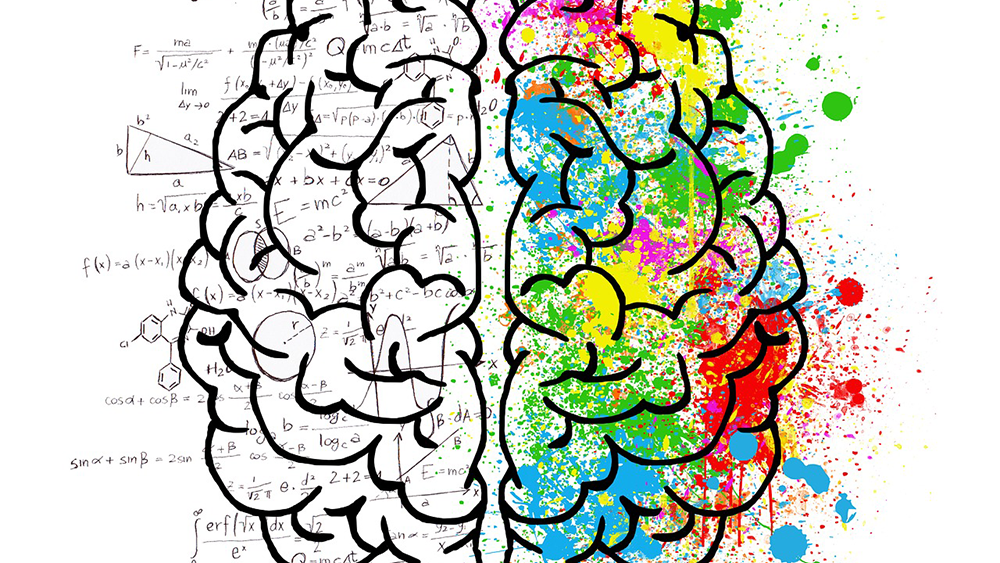
It's that time of year again when the powers that be are trying to make cuts to the National Endowment for the Arts.
Because the arts are so important to me and ingrained in my existence, it's difficult to remember that not everyone understands their value. Over the years, I've had to have several conversations with friends and family about the importance of the arts trying to convince them of their value. I'm sure many of you have too.
One thing that always stresses me out is trying to think on the spot of all of the scientific articles I've read in support of the arts and so, this time... I'm prepared. I'm just going to put it all out on the table here - a series of studies, journal articles, and defenses for the arts as well as singing itself.
This is your proof in the pudding that choir matters and arts matter.
Singing and Its Effect on Stress & Anxiety

For those of us who sing in choir, we know that choir relieves stress and anxiety because we've experienced it ourselves (unless you serve on the board, then it can sometimes have the opposite effect!). But apart from anecdotal evidence, there are studies that directly demonstrate the impact singing has on a person's anxiety and stress levels.
Psychological and physiological effects of singing in a choir - This study tries to quantify how singing in a choir affects the singer's emotional state and anxiety levels. Ultimately, they found that singing in a choir does have a " positive impact on psychological indicators of affect and anxiety." No surprises there.
Effects of Choir Singing or Listening on Secretory Immunoglobulin A, Cortisol, and Emotional State - This study takes singers in an amateur choir and explores how choral music affects their secretory immunoglobulin A (S-IgA), cortisol, and emotional states. They found that "choir singing positively influences both emotional affect and immune competence."
Singing and Its Effect on Mental Health and Well-Being

As I get older, I'm realizing more and more the importance of mental health and well-being. Taking time off of work to spend time with family and do things that make you happy is really crucial. Singing just happens to be one of those activities that has a positive impact on your overall well-being.
The psychological benefits of participating in group singing for members of the general public - This was a broad study looking at members of the public who sing regularly in choirs. "Results illustrate that group singing is a joyful activity that promotes wellbeing and is life enhancing for those involved."
‘To be heard’: The social and mental health benefits of choir singing for disadvantaged adults - According to the abstract, this small study looked at the personal experiences of choral singers with mental health problems, physical disabilities, and intellectual disabilities in their relation to their well-being. "Results of this study were consistent with the social identity theory notion that forming a new and valued group identity (as a choir member) was associated with emotional and health benefits for the participants."
Adaptive Characteristics of Group Singing: Perceptions from Members of a Choir For Homeless Men - This study analyzed interviews of members of a choir for homeless men. The answers suggested that "group singing appears positively to influence emotional, social and cognitive processes... Active participation in singing may act to alleviate depression, increase self-esteem, improve social interaction skills and induce cognitive stimulation. The themes adhere to the tenets of flow theory which advocate the importance of mental stimulation and social interaction in increased life satisfaction."
Singing and Its Effect on Social Bonding and Social Interactions

Honestly, the world could use a lot more social bonding right now. Music is one way to create a strong social bond between individuals and groups, and is, in my opinion, the best way to foster humanity. If you don't believe me, just look at that video of singers from the Notre Dame fire - just one example of the power of music to bring people together. Here's the research though, in case you still need it:
Unraveling the mystery of music: Music as an evolved group process - This study explores the reasons why humans respond emotionally to music. Their research "establishes human musicality as a special form of social cognition and provides the first direct support for the hypothesis that music evolved as a tool of social living. In addition, the findings provide a reason for the intense psychological pull of music in modern life, suggesting that the pleasure we derive from listening to music results from its innate connection to the basic social drives that create our interconnected world."
Singing and social bonding: changes in connectivity and pain threshold as a function of group size - This study looked at how music making affects social bonds in a large group setting. "Results showed that feelings of inclusion, connectivity, positive affect, and measures of endorphin release all increased across singing rehearsals and that the influence of group singing was comparable for pain thresholds in the large versus small group context... singing together fosters social closeness – even in large group contexts where individuals are not known to each other – is consistent with evolutionary accounts that emphasize the role of music in social bonding."
The ice-breaker effect: singing mediates fast social bonding - This study attempts to answer the question, could music be the best ice-breaker for groups of strangers? They claim to have found the "first evidence for an ‘ice-breaker effect’ of singing in promoting fast cohesion between unfamiliar individuals, which bypasses the need for personal knowledge of group members gained through prolonged interaction." The study stated that "singing may have evolved to quickly bond large human groups of relative strangers, potentially through encouraging willingness to coordinate by enhancing positive affect."
Singing and Its Effect on Physical Health and The Brain

Look, I'm not a doctor. But there have been more doctors starting to experiment with music as medicine and treatment. And they're learning from it every day. There's also plenty of new research out there on how music impacts brain development and neurological pathways. Here are a few findings:
Music structure determines heart rate variability of singers - This study hypothesizes that singing requires a slower than normal respiration which, in turn, impacts their heart activity. Together, the two work together to have a biologically soothing effect which they claim is beneficial for cardiovascular function.
Music Making as a Tool for Promoting Brain Plasticity across the Life Span - This discusses how musicians have a specific way of training their neural network which may have effects on their other behavioral or cognitive operations. The study argues that "plasticity in this network may explain some of the sensorimotor and cognitive enhancements that have been associated with music training. These enhancements suggest the potential for music making as an interactive treatment or intervention for neurological and developmental disorders, as well as those associated with normal aging."
‘Singing for the Brain’: A qualitative study exploring the health and well-being benefits of singing for people with dementia and their carers - This study looks at the effect of singing on people with dementia and their caregivers. "Social inclusiveness and improvements in relationships, memory and mood were found to be especially important to participants. As well as enjoying the sessions, participants found that attending Singing for the Brain™ helped in accepting and coping with dementia."
Words in melody: an H2 15O PET study of brain activation during singing and speaking - This study looked at how words and a melody impacted brain activity. The results suggest that "multiple neural networks may be involved in different aspects of singing. Right hemisphere mechanisms may support the fluency-evoking effects of singing in neurological disorders such as stuttering or aphasia."
Music Pharmacology by Soundcheck - Live interview with Dr. Kamal Chemali, a neurologist at the Cleveland Clinic as well as a pianist; and Vera Brandes, director of an Austrian research program at Paracelsus Medical Private University Salzburg. Dr. Chemali elaborates on a recent study at Cleveland Clinic which found that music can slow the neuronal firings deep within the brain during surgery designed to treat Parkinson's patients.
Singing and Its Effect on Our Emotions

This one is probably the easiest for everyone to understand - how our emotions are impacted by music. If you've ever felt like a song has lifted you up, made you cry, or gave you a chill - you have experienced music's impact firsthand. If you haven't, maybe you should get your soul checked? Here's why it does that:
Thrills in response to music and other stimuli - "Approximately half of those surveyed experience characteristic tingling sensations (thrills) when exposed to emotionally arousing stimuli. Music was especially effective as a stimulus. Thrills evoked by music were quantitated according to self-reports on frequency, intensity, and duration. In preliminary experiments with naloxone, an opiate receptor antagonist, thrills were attenuated in some subjects."
The Rewarding Aspects of Music Listening Are Related to Degree of Emotional Arousal - "In this study, using methods of high temporal sensitivity we investigated whether there is a systematic relationship between dynamic increases in pleasure states and physiological indicators of emotional arousal, including changes in heart rate, respiration, electrodermal activity, body temperature, and blood volume pulse... Results revealed a strong positive correlation between ratings of pleasure and emotional arousal. Importantly, a dissociation was revealed as individuals who did not experience pleasure also showed no significant increases in emotional arousal."
Intensely pleasurable responses to music correlate with activity in brain regions implicated in reward and emotion - This study looked at the pleasurable experience of "chills" when listening to music and its impact on physical elements such as heart rate and respiration. "As intensity of these chills increased, cerebral blood flow increases and decreases were observed in brain regions thought to be involved in reward/motivation, emotion, and arousal, including ventral striatum, midbrain, amygdala, orbitofrontal cortex, and ventral medial prefrontal cortex. These brain structures are known to be active in response to other euphoria-inducing stimuli, such as food, sex, and drugs of abuse. This finding links music with biologically relevant, survival-related stimuli via their common recruitment of brain circuitry involved in pleasure and reward."
Singing and Its Effect on Society & The Economy

You might be surprised to hear that arts nonprofits, including choruses, have a positive impact on our society and even the economy.
Impact of the Arts on Individual Contributions to US Civil Society - "We find strong evidence that the arts enhance civil society. Both audience-based participation in the arts and personal participation in creating art are linked to higher levels of civic engagement, higher levels of social tolerance on some dimensions of the measure, and higher levels of other-regarding behaviour. Our findings have important implications, in that they demonstrate a strong association between the arts and individual-level social outcomes that contribute to the health of civil society."
Arts and Economic Prosperity 5 Report from Americans for the Arts - This study explores the impact of the nonprofit arts/culture industry on the U.S. economy. Results show that the nonprofit arts and culture industry brought $166.3 billion of economic activity during 2015, supporting 4.6 million jobs, and generating $27.5 billion in revenue to local, state, and federal governments.
Conclusion
This is just a sampling of the studies out there on music, singing, and their effects on humans and society. Of course, there is still a lot of research to do in order to make more definitive claims, but there's certainly enough evidence here to show that singing matters, choir matters, and arts matter.
Now, if only there was an organization that could fund us in our efforts to do more musical research and bring more music to our communities.... oh wait, there is. Let's not lose the funding for it! To help deter budget cuts to the National Endowment for the Arts, check out Americans for the Arts Advocate Hub, Performing Arts Alliance, National Association for Music Education, or your local arts organizations and learn what you can do to help.

Tori Cook is the former Director of Sales & Marketing at Chorus Connection, an active board member of the Greater Boston Choral Consortium, and a soprano with the Tanglewood Festival Chorus. In a past life, she was the Music Director of the Harborlight Show Chorus and President of Chorus pro-Musica. When not making music, she daydreams about adopting a golden retriever puppy and scuba diving to exotic locations around the world.

